Is it Bad for Dogs to Eat Moss? What You Need To Know!
Is it Bad for Dogs to Eat Moss? What You Need To Know!
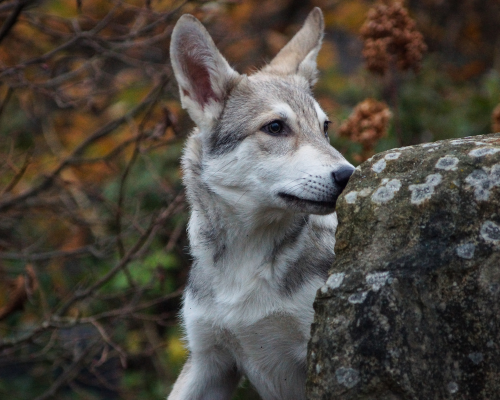
Vet Reviewed

By: Sarah Hodgson
December 11, 2023
Table of Contents
Whether our dogs are inside or outside we're always worried for them especially when it comes to them being curious as they like to smell, feel, and eat new things moss being one of those things.
So can dogs eat moss? In this article, we will explore whether moss is bad for dogs and what you can do to prevent them from coming near it.
So let's dive in!
What Exactly Is Moss?
Before we dive into the effects of dogs eating moss, it is important to understand what moss actually is.
Moss is a type of small, non-vascular plant that belongs to the Bryophyte division. It typically grows in moist environments and can be found in forests, gardens, and even on rocks and trees. Moss is known for its velvety texture and vibrant green color, which adds a touch of natural beauty to any landscape. While it may seem harmless, it is essential to consider its impact on our furry companions.
It looks like grass and I'm sure you've seen it before. Below is a picture showing what moss looks like.
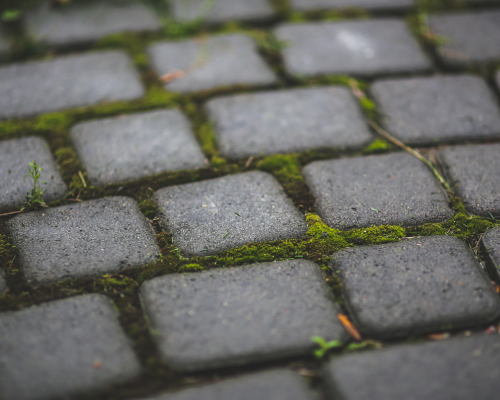
Why Do Dogs Like Eating Moss?
Dogs have a natural instinct to explore their surroundings and taste different things. So it's no question that moss
1. Texture and Sensation
Moss, with its intriguing texture and earthy aroma, might attract their attention. Chewing on moss provides a different sensation for their mouths compared to regular dog food.
2. Eating Moss Is Instinctual
Dogs have inherited behaviors from their wild ancestors. In the wild, dogs might have consumed plants for various reasons, such as aiding digestion or obtaining essential nutrients. Eating moss could be an instinctual behavior rooted in their evolutionary history.
3. Nutritional Appeal
Moss may contain certain minerals or nutrients that attract dogs. While dogs are primarily carnivores, they may seek out plants occasionally to supplement their diet with essential elements like fiber, vitamins, or minerals that may be lacking in their regular food.
4. Stomach Upset Relief
In some cases, dogs may eat moss to induce vomiting if they're feeling unwell. This behavior is instinctual and can help them clear their stomach of indigestible material. However, it's crucial to differentiate between intentional moss consumption and accidental ingestion.
5. Stress or Boredom:
Dogs may engage in unconventional eating habits, such as consuming moss, as a response to stress or boredom. Chewing on non-food items can sometimes be a coping mechanism for dogs experiencing anxiety or lack of mental stimulation.
Note
Not all dogs are inclined to eat moss, and their preference for it may vary. However, it is crucial to understand the potential risks associated with this behavior.
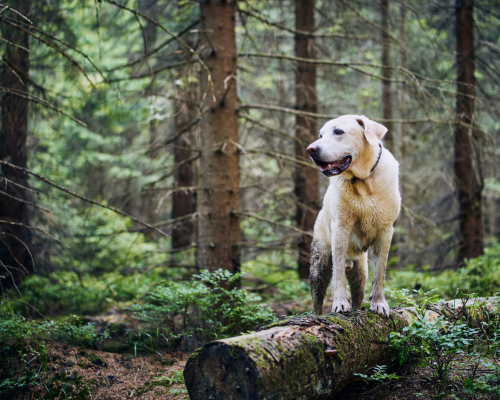
Is it Bad for Dogs to Eat Moss?
So now to the question you came here for, can dogs eat moss?
Green garden moss does in itself not pose any risk if eaten. However, other types of moss such as rock moss can be toxic to dogs. So it's best to stay away from all types of moss.
First and foremost, the consumption of moss can lead to gastrointestinal issues. Dogs might experience symptoms such as vomiting, diarrhea, or abdominal pain. Moreover, certain types of moss may contain harmful substances or parasites that can pose a threat to their health.
Here's a list below of all types of moss and whether they are safe or not.
1. Rock Moss:
- Description: Rock moss, characterized by its ability to thrive on hard surfaces, adds a touch of green to rocky landscapes. It's resilient and often forms intricate patterns on stones.
- Risk for Dogs: Rock moss are toxic, their fibrous texture may cause mild digestive upset if ingested in large quantities.
2. Garden Moss:
- Description: Garden moss, a common feature in shaded and moist areas, contributes to the lushness of outdoor spaces. It can be found on soil, trees, or decorative structures within a garden.
- Risk for Dogs: Generally non-toxic, garden moss may lead to digestive discomfort if consumed excessively. Identifying specific moss types in your garden is important for a more accurate risk assessment.
3. Sheet Moss:
- Description: Sheet moss, forming dense mats resembling carpets, thrives in wooded environments. It covers the ground, rocks, and even tree trunks, creating a soft, mossy landscape.
- Risk for Dogs: Sheet moss is typically non-toxic, but like any plant material, consuming large quantities may result in digestive issues for your dog.
4. Spanish Moss:
- Description: Spanish moss, an epiphytic bromeliad, gracefully hangs from trees, adding a touch of mystery to Southern landscapes. It's not a true moss but shares the name due to its appearance.
- Risk for Dogs: While generally considered non-toxic, the fibrous nature of Spanish moss suggests caution. It's advisable to prevent ingestion as a preventive measure.
5. Peat Moss:
- Description: Peat moss, a common gardening component, enhances soil quality by retaining moisture. It's often used in potting mixes to promote plant health.
- Risk for Dogs: Peat moss itself is not toxic, but consuming excessive amounts might lead to digestive upset. Be mindful of any additives or fertilizers that could pose a risk.
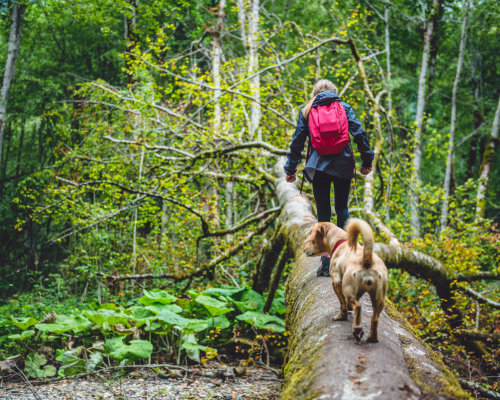
Is Moss Toxic For Dogs?
As we just mentioned earlier, although moss is generally not considered toxic to dogs, there are exceptions. Some species of moss, such as haircap moss or cushion moss, can contain toxic compounds that may cause adverse effects. These toxic compounds can irritate the digestive system and lead to discomfort or illness in dogs. Therefore, it is crucial to identify the specific type of moss and consult with a veterinarian if you suspect your dog has ingested a toxic type.
What Are The Risks Of Dogs Eating Moss?
The risks associated with dogs eating moss primarily revolve around digestive issues and potential toxicity and they include:
- Digestive Upset: Ingesting moss, especially in large quantities, can lead to gastrointestinal distress in dogs, causing symptoms such as vomiting, diarrhea, or stomach discomfort.
- Foreign Body Ingestion: The fibrous nature of some moss varieties poses a risk of foreign body ingestion. Accumulation of moss in the digestive tract can lead to blockages, requiring immediate veterinary attention.
- Toxicity: Certain moss species can be toxic to dogs, causing a range of symptoms from mild gastrointestinal upset to more severe reactions. Identifying the specific type of moss is crucial for assessing toxicity risks.
- Mold and Bacteria Exposure: Moss, particularly in damp environments, may harbor mold and bacteria. Ingesting contaminated moss can lead to additional health issues beyond simple indigestion.
- Dental Issues: Chewing on moss might contribute to dental problems, such as the accumulation of plaque and tartar. While this is not exclusive to moss, it's a consideration for dogs prone to dental issues.
- Behavioral Issues: Regular consumption of non-nutritive substances like moss may indicate underlying behavioral issues, stress, or boredom in dogs. Addressing the root cause is important for their overall well-being.
- Plant Additives or Fertilizers: If moss is cultivated in an environment where additives or fertilizers are used, ingesting these chemicals along with the moss can pose additional risks to a dog's health.
What Symptoms To Look For If My Dog Ate Moss
If your dog has ingested moss, there are several symptoms to be aware of. One of the most common symptoms is gastrointestinal upset, which may manifest as vomiting or diarrhea. Moss can be irritating to the digestive system, causing inflammation and discomfort. Additionally, some dogs may experience lethargy or a loss of appetite after consuming moss. If you notice any of these symptoms in your dog, it is important to monitor their condition closely and seek veterinary attention if necessary.
Another potential concern when dogs eat moss is the risk of toxicity. While moss itself is not typically toxic to dogs, it can harbor harmful substances. For example, some species of moss may contain chemicals that can be harmful if ingested in large quantities.
Note
If the moss has been treated with pesticides or other chemicals, it can pose an even greater risk to your dog's health. Therefore, it is crucial to prevent your dog from consuming moss and to be cautious when allowing them to explore outdoor areas where moss may be present.
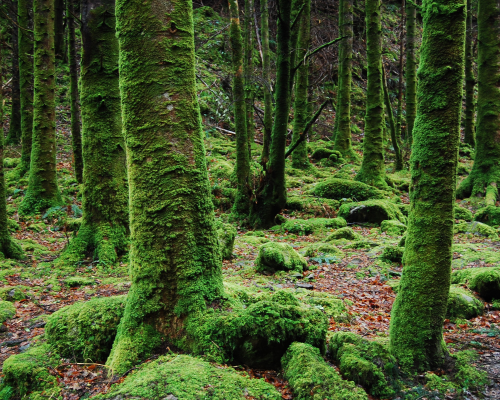
How To Prevent My Dog From Eating Moss?
Preventing your dog from eating moss can be challenging, but not impossible. Here are some tips to help you keep your furry friend away from moss:
- Supervision and Leash Control: Keep a close eye on your dog during walks or outdoor activities, especially in areas where moss is prevalent. Use a leash to maintain control and prevent them from wandering off and ingesting moss.
- Training and Commands: Train your dog with commands like "leave it" or "drop it." This helps in redirecting their attention away from moss and discourages them from picking up non-food items.
- Provide Sufficient Nutrition: Ensure your dog's diet is well-balanced and provides all necessary nutrients. Sometimes, dogs may seek out unusual substances if they are lacking certain vitamins or minerals. Consult with your veterinarian to ensure your dog is on an appropriate diet, and consider high-quality dog food that meets their nutritional needs.
- Create a Safe Outdoor Space: Designate a safe and well-maintained area for your dog to play in, minimizing their exposure to potentially harmful plants like moss. Regularly inspect and clean the designated play area, removing any moss or other potentially toxic plants.
- Use Pet-Safe Deterrents: Some pet-safe deterrents can be sprayed on moss or other areas to discourage dogs from approaching or tasting the plants. Consult with your veterinarian for recommendations on safe deterrents or use natural substances like bitter apple spray to make moss less appealing.
- Environmental Management: Modify your dog's environment to limit access to moss. Use fences, barriers, or landscaping to create boundaries and reduce the likelihood of exposure. Adjust your landscaping to minimize moss growth in areas accessible to your dog, or use physical barriers to restrict access.
The Bottom Line
So there you have it, it is generally not advisable for dogs to eat moss due to the potential risks it poses to their health. While most moss itself is not toxic, certain species may contain harmful substances or parasites. Dogs that ingest moss may experience gastrointestinal upset, and in some cases, toxicity can occur.
Therefore, it is essential to prevent your dog from eating moss and monitor their behavior closely. Stay safe and moss free!
Frequently Asked Questions
Are all types of moss equally dangerous for dogs?
Not all moss species are equally toxic, but it's challenging to distinguish between safe and harmful varieties. As a general rule, it's best to prevent dogs from ingesting any type of moss.
Is it necessary to seek veterinary attention if my dog only ate a small amount of moss?
Even small amounts of moss can pose a risk, and it's advisable to consult with a veterinarian to assess the situation. Early intervention can prevent potential complications.
Are there any safe alternatives for dogs to chew on outdoors?
Yes, providing safe chew toys or treats specifically designed for dogs can be a good alternative. Ensure these items are free from harmful substances and are suitable for your dog's size and chewing habits.
Can moss ingestion lead to long-term health issues in dogs?
In some cases, repeated ingestion of moss or exposure to toxic compounds may result in long-term health issues. Timely veterinary intervention is crucial to address any potential problems.

Subscribe to Petfluence!
Get updates on the latest posts and more from Petfluence straight to your inbox.